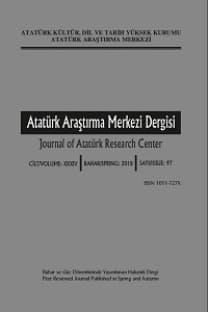Atatürk'ün Kayseri'yi Ziyaretleri
Mustafa Kemal Paşa, Millî Devlet kurma yolunda, 19 Mayıs 1919 tarihinde Türk Millî Mücadele Hareketini başlatmak üzere Samsun’a çıktıktan sonra, 22 Mayıs 1919 tarihli ilk resmi raporunda; Türk Milleti’nin yabancı himayesini istemeyeceğini ifâde ile Millî Mücadelemizin ve Cumhuriyetimizin kuruluşuna esas olan şu cümleyi dost düşman herkese duyurmuştur. “Millet birlik olup, hâkimiyet esasını ve Türklük duygusunu hedef seçmiştir.” 26 Mayıs 1919’da Havzalılar ile yaptığı sohbette ise, Mustafa Kemal Paşa: “Hiç bir zaman ümitsiz olmayacağız ve memleketimizi kurtaracağız.” diyerek, Türk Milletini iç ve dış düşmanlara karşı millî mücadeleye davet etmiştir.
Havza’dan mülki âmirlere ve komutanlara göndermiş olduğu bildiriyle işgal hareketlerine ve özellikle İzmir’in Yunanlılar tarafından işgal edilmesine karşı millî gösteriler yapılmasını ve bu gösterilerin Türk ve Dünya kamuoyuna telgraflarla duyurulmasını istemiştir. Bu cümleden olmak üzere; Kayseri’ye de “Ordu Müfettişi Mustafa Kemal” imzasıyla 28 Mayıs 1919 tarihli Havza çıkışlı bir telgraf gelmiştir. Kayserililer, İzmir’in işgâlinin tel’in ve protesto edilmesi yolunda, millî mitingler yapılmasını isteyen Mustafa Kemal Paşa’nın bu tarihî emrine hemen uymuşlar ve miting yapmak üzere teşebbüse geçmişlerdir. Fakat, bu millî teşebbüse, zamanın Kayseri Mutasarrıfı izin vermemiş ve böylece de, İzmir’in Yunanlılar tarafından işgalini lânetlemek üzere, ülkenin pekçok yerinde açık hava mitingleri yapılmasına rağmen Kayserililer, bu millî heyecanlardan mahrum bırakıl¬maya çalışılmıştır. Ancak Kayserililer, İzmir’in işgaline karşı uyanan bu millî heyecanlarını, Kiçikapı semtindeki Aynalı Gazino’da yapılan bir toplantıda ortaya koyarak, Türk Milleti’nin müşterek tepkisine katılmaktan geri kalmamışlardır
Anahtar Kelimeler:
Atatürk, Kayseri, Milli Mücadele Hareketi
Atatürk's Visits to Kayseri
In his first official report dated May 22, 1919, after Mustafa Kemal Pasha went to Samsun to start the Turkish National Struggle Movement on May 19, 1919, on the way of establishing a National State; He declared that the Turkish Nation would not want foreign protection, and that this sentence, which was the basis for the establishment of our National Struggle and Republic, was announced to all friendly enemies. “The nation is united and has chosen the principle of domination and the sense of Turkishness.” In his conversation with the Basins on 26 May 1919, Mustafa Kemal Pasha said: "We will never be hopeless and we will save our country." He invited the Turkish Nation to national struggle against internal and external enemies. With the notification he sent from Havza to civil servants and commanders, he demanded national demonstrations against the occupation movements and especially the occupation of İzmir by the Greeks and that these demonstrations should be announced to the Turkish and the world public by telegraphs. From this sentence; A telegram originating from the Basin on 28 May 1919 was brought to Kayseri with the signature of "Army Inspector Mustafa Kemal". Kayseri people immediately followed this historical order of Mustafa Kemal Pasha, who wanted to hold national rallies on the way of protesting the wire and protest of İzmir's occupation and started an attempt to hold a rally. However, the Kayseri Governor of the time did not allow this national initiative, and so, despite the open air rallies in many parts of the country to curb the invasion of İzmir by the Greeks, the Kayseriians were tried to be deprived of these national excitements. However, the people of Kayseri were not left behind to participate in the joint reaction of the Turkish Nation by revealing their national excitement, which was awakened against the invasion of İzmir, at a meeting held in Aynalı Gazino in the Kiçikapı district.
Keywords:
Atatürk, Kayseri, National Struggle,
___
- Kalaç, Ahmet Hilmi: Kendi Kitabım, Ankara 1960, s. 147
- Ahmet Vehbi Ecer, “Millî Mü- cadele’de Kayseri”, Kayseri Kültür ve Sanat Haftası Tebliğleri, s. 44
- Aynı Müellif, “Mustafa Kemal Paşa’nın Heyet-i Temsiliye Reisi olarak Kayseri’ye Gelişi” Erciyes Üniversitesi İlâhiyat Fakültesi Dergisi, Sayı 4. Kayseri 1987, s. 99.
- ISSN: 1011-727X
- Yayın Aralığı: Yılda 2 Sayı
- Başlangıç: 1984
- Yayıncı: Atatürk Kültür, Dil ve Tarih Yüksek Kurumu Atatürk Araştırma Merkezi
Sayıdaki Diğer Makaleler
Atatürk'ün Kayseri'yi Ziyaretleri
Çanakkale Zaferi Üzerine Alman İddiaları
Türk Dünyası ve Atatürkçü Çağdaşlaşma
Bilecik ve Çevresinde Yunan Mezalimi
Sine-i Millete İltica Eden Meclis-i Meb’ûsan-ı Osmani Reisi Celâleddin Arif’in Ankara Yolculuğu
